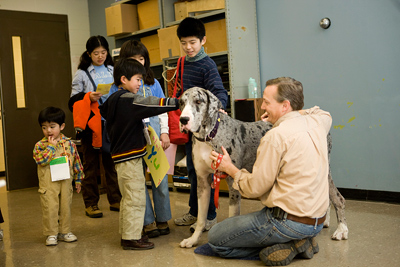Cornell Companions animals lend a paw (or hoof, or wing)
By Sarah Perdue

Walking the halls of BOCES' Darwin C. Smith School, which is attended by about 300 developmentally disabled children, several teachers joke, "This place has gone to the dogs!" And it has: Twice a month, several dogs make their way around the school to work with the students.
The dogs are part of Cornell Companions, a pet visitation group that visits a dozen sites around Tompkins County to promote the benefits of the human-animal bond.
Animals provide a positive force during their visits, because they are nonjudgmental, says Robin Hamlisch, a counselor in the Office of Student Services in Cornell's College of Veterinary Medicine and the director of the Cornell Companions.
"There has been a lot of research that shows the emotional, physical, psychological and physiological benefits from the human-animal bond, and I know this program is really important," said Hamlisch.
"The visits really benefit the kids because it connects them to the animals," said Joe Columbo, a teacher at the Smith school. "They learn cooperation and responsibility by walking the dogs together and taking turns with the dogs, and the autistic students especially gain needed sensory experience from being able to pet the dogs or brush them."
"I think the children relax around dogs in a way they don't around people," said Jean Snow '74, a local dairy farmer who has been volunteering with the program for four years with two of her dogs. "My golden retriever, Sophie, visited one boy who would not count in class, but he had a great time counting Sophie's toes, paws and ears."
The program has about 100 active teams, with animals ranging from dogs and cats to the less common camels and birds. The human volunteers are primarily Cornell staff members and vet students but also some community members. In addition to visiting BOCES and other centers for developmentally disabled children, volunteer teams regularly visit nursing homes, adolescent residential centers such as the Lansing School for Girls, Hospicare and Cayuga Medical Center.
The group occasionally makes special visits to such events as the Family Reading Partnership's Kids' Book Fest, where children can read books to the animals; or to the Cornell dorms, where students can play with the dogs as a relaxing study break.
"The benefits of the program to me and my three dogs are endless," said Joyce Roenfeldt, who has been with the program for 11 years. "My dogs are very excited to interact with people, and I have the opportunity to help the elderly, young people and disabled children experience the love and affection the dogs have to give."
To volunteer with the Cornell Companions, e-mail Robin Hamlisch at rgh8@cornell.edu for more information about the program's training sessions and pet screenings.
"We can barely meet the needs of the facilities we are going to now, and we could use another surge of volunteers," she said, adding that all species are welcome.
Graduate student Sarah Perdue is a writer intern at the Cornell Chronicle (and a member of Cornell Companions).
Media Contact
Get Cornell news delivered right to your inbox.
Subscribe